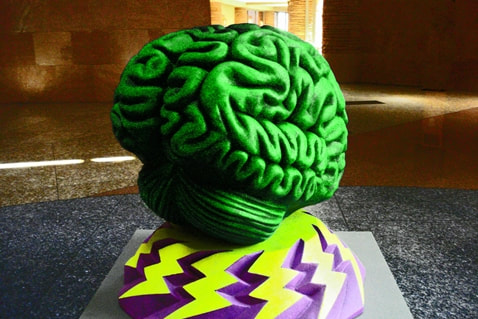Inside the Mind of a Person with Chronic Lyme Disease
The Loss and Distress of Great Psychological Qualities and Workings
If not presenting any empirical, physical symptoms of chronic Lyme Disease is troubling enough to convey a conviction, then any attempt to portray the symptoms of the mind of a person enduring chronic Lyme Disease will be fortunate enough to even be just considered.
|
For a person who has never had chronic Lyme Disease, their attempt at understanding the state of mind of those with chronic Lyme Disease hardly becomes intuitive. And without the experience of fighting chronic Lyme Disease themselves, they could never truly understand, regardless of how sincere, honest, and persistent their attempt to do so is. It's just the nature of the reality. For those without chronic Lyme Disease, the closest form of relation they can grant a person with chronic Lyme Disease is through the acceptance and acknowledgement of their mental distress, and not an unachievable understanding that can only be found through experience.
|
|
While not everyone who has chronic Lyme Disease will experience these psychological distortions and disruptions, most with chronic Lyme Disease will experience all at one point or another throughout their struggle with Lyme. Some will experience these symptoms to greater extents with more consistency than others and vice versa. And while these are not all of the psychological distresses a person with chronic Lyme Disease can experience, they're some of the most common they can endure at any given time.
1. Loss of Compassion and Sympathy
Compassion is a beautiful trait expressed by the human species to not only members of its own species, but to other species as well. In the face of hurt and suffrage, a person may receive comfort and sympathy from another. Such is this social beauty that a situation of distress will have less of a negative impact on a person than before the compassion was applied.
Many times a person with chronic Lyme Disease will come off as if they don't care about what a person without chronic Lyme Disease would normally care about or for. While the behavior they display comes off as rude, selfish, or a great lacking of compassion and sympathy, the truth is that they've lost their ability to care. And it's not because they choose not to care or express compassion, but rather that the part of the brain designed to generate and execute these valuable emotions are under the influence of a bacteria, toxins, and inflammation.
In fact, many times those with chronic Lyme Disease find themselves in a situation where compassion or sympathy is called upon or appropriate, and not only are they unable to provide it, they are aware that they can't. It's almost like an emotional paralysis, in that they know and want to feel compassion or sympathy, but no matter how much they desire or pine to do so, they're unable to move the emotions. And to disconnect the person even more from the moment, they may not even feel ashamed of their abnormal behavior for the same reason they can't console.
While this reality itself seems rather strange and hard to grasp, when compared to how most people behave when they consume the right amount of alcohol, the two come off as polar opposites. A person who drinks alcohol is more prone and likely to express how they really feel about situations or people than had they not consumed alcohol. The opposite is true in those with chronic Lyme Disease as the bacteria's impact serves as the influence now. As a person who drinks alcohol is more likely to express what they feel, a person under the influence of chronic Lyme Disease may be more prone to express what they don't feel. And what they sometimes don't feel is compassion and sympathy regardless of how serious of situation is presented. Whether a person under the influence of Lyme or alcohol is aware of their unusual behavior at the time
|
|
2. Loss of Conscience and MoralityWho is to say what is right or wrong? These decisions are made by what either a person feels inside, their conscience, what they have been told by others, morality, or a combination of the two. As generations pass, what we collectively as a species consider to be a wrongful act or behavior, can become an act that is no longer considered to be of wrong doing. Even more interesting is that each individual person, through experience, develops their own understanding of what is considered right and wrong in the eyes of society, and may change many times throughout a lifetime.
|
But then it really doesn't matter what is right or wrong, it's how each individual person reaches their own satisfaction in a situation. Because what one person may feel is right, another person may feel wrong about, but these two people will both reach a satisfaction despite the difference in how each achieved it. A person enduring chronic Lyme Disease may have a day in which they mentally feeling nothing at all (i.e., floating). They're emotionally numb which means that satisfaction or pleasure of any kind from any source will likely not be felt in their mind. This difficult and challenging mental state a person with chronic Lyme Disease endures can thus give the illusion to others, though temporary, that they have lost their sense of morality or completely lack any conscience.
3. Loss of Value, Purpose, Meaning, and Worth
There is a simple, but encompassing quote by Professor Stephen Hawking - "Work gives you meaning and purpose and life is empty without it." We as humans inherently desire to feel worth, of great value, relevant, and significant to some extent. These abstract manifestations are the result of what we do in our lives, the purposes we fulfill and don't. But it is the purpose itself that is subject to change throughout life, and as a result, the value and meaning we found for the longest time in one purpose, may no longer be obtainable as time passes. What determines how important or worthy we feel depends on our own individual perception of our doings and accomplishments.
This is exactly why people with chronic Lyme Disease may feel irrelevant, worthless, insignificant the longer they endure the disease. Before contracting chronic Lyme Disease, a person likely has many purposes (e.g., school, work, hobby, etc). Some purposes were found to be significant or appealing than others, but nonetheless, purpose existed. And as a result of these purposes, value, worth, and significance were generated in the mind to varying degrees. With the presence of chronic Lyme Disease taking hold, the odds are very good that the purposes a person never questioned the certainty of, were unwillingly abandoned due to extreme and unprecedented physical, social, emotional, and mental deterioration. And without these purposes, no longer may a person with chronic Lyme Disease feel any value or significance in their existence.
4. Loss of Identity
Who are you? Roger Daltrey asked this question many many times throughout his life, and even to this day he continues. But as many times as he's asked the question, have you ever been able to respond with a satisfying answer? Have you ever been able to truly define yourself? While the act of conveying your constitution to others is no easy task, every human being knows who they truly are inside. But what is it about us that allows us to identify our own self?
Through what we know and do, we develop an identity to which we become familiar and associate ourselves with. And because what we know and do constantly changes throughout our lives, we must logically deduce that our identity does as well.
However, most changes in what we do and know are small and leave no apparent trace, nor do we ever really give them any conscious acknowledgement. Our identity changes just a little bit every day, but the change is so subtle. It isn't obvious we become a different person until the passing of say 10 years, or any large amount of time that makes it known, that allows you to look back and compare yourself to what you used to know and do, to what you now know and do. Much in the same way that you'd notice how much a person has physically changed if you haven't seen them in a while, as opposed to not noticing their physical changes had you seen them every day.
A person who finds themselves at the mercy of chronic Lyme Disease may wake up one day and not know who they are. It's not that they don't who they are in the sense of complete memory deletion or amnesia , but completely in the sense that they remember who they once were and are no longer; and even the uncertainty of who they are now. The change to the identity of a person with chronic Lyme Disease is in no way subtle because nearly everything that constitutes their identity, what they know and do, has been completely removed from them.
By unwillingly leaving purposes (i.e., what a person does) behind because of chronic Lyme Disease, the grand alternation to their identity has begun. And because it's so grand, it becomes noticeable almost immediately. Opposition may arise in the beginning to the abandonment of their purposes, but eventually acceptance infiltrates the mind and the resistance yields to Lyme.
|
|
A person with chronic Lyme Disease may have lost their sense of purpose in the beginning of contracting Lyme, but the loss of what they know usually comes later on. It comes in the form of memory loss in which a person will not be able to recall certain details of their life that allowed association to an identity, and floating, which can remove a person's entire ability to feel any type of emotion, despite an ever present knowledge of how they once felt towards someone or something. It even gets worse because any attempt by a person enduring Lyme Disease to reconstruct their identity also becomes hindered by the Lyme itself.
|
A person who can no longer emotionally feel, will not know what they feel. And when a person doesn't feel for anything, they can not develop any value and meaning in what they try to do. What they do is then pushed aside, and as a result, no identity, if any at all, is reconstituted for the duration of the disease's impact.
In Conclusion
When a bacteria as powerful and highly evolved as Borrelia Burgdorferi (i.e., the bacteria responsible for chronic Lyme Disease) enters the body, a biological hijacking occurs to a degree that which no man or woman could ever be prepared for. Disruptions of both the physical and mental workings of the body leave the person enduring, in great awe and astoundment.
But as strange, ineffable, and unfamiliar as the symptoms of the mind are, they are temporary. The workings of the human mind will be restored as healing progresses from chronic Lyme Disease. The progress won't be sudden or immediately noticeable, but very much gradual. Patience is required at levels never sought out before, and persistence, though it may take great hits throughout the battle, must remain at all times. Sometimes in life we stumble upon inconveniences; some more grand than others. But what doesn't change is the ever present and available great will every person possesses to move forward and beyond.
Also on Tired of Lyme
Refresh
Refresh
Subscribe to Tired of lyme!
Subscribe to Tired of Lyme's mailing list and get notified of new articles!





Comments